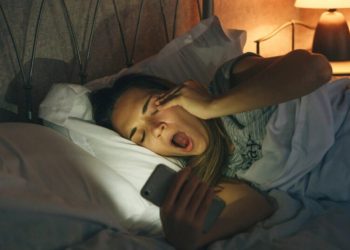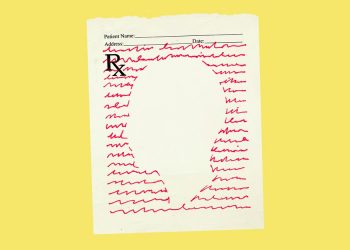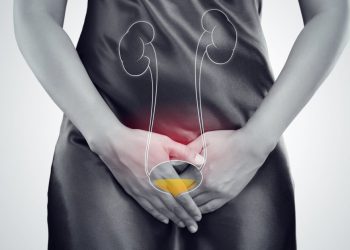Reviewed by Jennifer Martin, PhD
Maybe you’ve seen the headlines about how oversleeping has been linked to a greater risk of disease and death. If you’re the kind of person who regularly clocks more than eight hours of slumber, these news stories have probably made you wonder, “Why do I sleep so much? And is it bad for me?”
In this story, sleep experts help you understand the latest science. You’ll find out what really happens when you oversleep, along with how it affects your health.
(Spoiler: Chances are, you have nothing to worry about.)
How much is too much sleep?
On average, most people need somewhere between seven and nine hours of sleep each night. But that’s an average, not a good-health edict.
“As you start to move out in either direction, there are people who require slightly more and slightly less sleep,” says Chris Winter, MD, sleep specialist, author of The Sleep Solution and The Rested Child, and co-author of Precision Nutrition’s Sleep, Stress Management, and Recovery Coaching Certification.
Above (and below) average sleepers fall into three main categories.
1. People who need fewer than 7 hours of sleep
Referred to as Natural Short Sleepers, these genetically-gifted folks don’t need as much sleep as the average person.
Increased levels of a hormone called orexin allows them to feel spunky and clear-headed with just five to six hours of shuteye.
Here’s an important caveat, though. Plenty of people who get less than seven hours aren’t Natural Short Sleepers. Rather, they skimp on sleep for other reasons, ranging from revenge-bedtime procrastination to parenthood to an “always on” work ethic.
If you’re not genetically a Natural Short Sleeper, skimping on sleep likely means you’ll either…
▶ feel like garbage the next day
▶ won’t feel like garbage the next day—but only because you’re so used to the effects of sleep deprivation that you’ve no longer remember what it feels like to be well rested
In addition to the above, over time, your risk for heart disease, cancer, and type 2 diabetes can go up as well.
(More about sleep and health further down in the story.)
2. People who need more than 9 hours of sleep
Due to their genetic makeup, Natural Long Sleepers usually need 10, 11, or 12 hours in order to feel refreshed. Their genetics also cause them to feel tired more quickly than other people.
Also in this longer-sleeping category: children, teenagers, and many young adults, all of whom need more sleep so their bodies can continue to develop, says Jennifer Martin, PhD, Professor of Medicine at the University of California, Los Angeles and also a co-author Precision Nutrition’s Sleep, Stress Management, and Recovery Coaching Certification.
Certain prescription medications can also increase sleep time, says Dr. Martin.
“Usually this effect is reversed when the person stops the medication, and in some cases, the sleepiness is reduced once the person gets used to the medication,” she says.
3. People who need 13+ hours of sleep
Some people sleep 14, 17, 24 or more hours with very little interruption, and they still wake feeling tired.
“If you find you are one of these people, it might be an indication that there is something wrong with your sleep quality, not necessarily the quantity,” Dr. Winter says. For example, sleep disorders like sleep apnea and insomnia can disrupt sleep, causing people to wake feeling unrefreshed.
A variety of health conditions—including epilepsy, Parkinson’s disease, and depression—can also lead to hypersomnia, which is the inability to stay awake. Narcolepsy, another hypersomnia condition, causes people to feel tired all the time, leading them to fall asleep at inappropriate and dangerous times, such as while on a date or driving a vehicle. These disorders require medical treatment.
If you suspect any of the above is true for you, it’s a great thing to mention to your doctor.
What happens when you sleep too much?
“For the average person, if they are sleeping, they probably need to be sleeping,” says Dr. Winter.
That’s because our bodies all have a sleep set point—referred to as “homeostasis.” Get too little sleep one night and your body will respond by craving more sleep the next. Alternatively, you may have noticed: If you collect more sleep than usual by sleeping in on a weekend, you’ll likely find yourself wide awake later that evening.
There are, however, some exceptions. More about those below.
(Find out: Would YOU make a great sleep coach?)
Does oversleeping harm your health?
Despite all of the scary headlines, it’s likely that long sleep itself poses little to no health problems. That’s because, in people who sleep more than most, it’s often the result of a chronic health problem, not the cause, finds research.1,2
Occasionally, the problem is bi-directional, meaning the health problem disturbs sleep, which worsens the health problem, which leads to worsened sleep, and the cycle continues.
These health problems include:
▶ Sleep disorders like sleep apnea (where breathing repeatedly stops during sleep) and narcolepsy (which is characterized by severe daytime sleepiness and sleep attacks)
▶ Diabetes
▶ Hypothyroidism
▶ Depression
▶ Chronic fatigue syndrome
▶ Heart disease
For the above conditions, it’s important to note that oversleeping doesn’t cause them. Rather, it’s a symptom of them.
For example, sleep apnea repeatedly wakes people, often for brief moments, during the night, which can lead to hypersomnia (excessive sleepiness during the day) as well as a strong desire to stay in bed longer than eight hours or to take a nap during the afternoon.
“When medical problems disturb sleep, it takes a person a longer period of time to be sufficiently recovered,” says Dr. Martin.
If you regularly get more than 10 hours, and you feel energetic and clear headed during the day, that’s great! Enjoy your slumber without fear. You most likely have nothing to worry about.
On the other hand, if you spend your days craving a nap—tired, brain fogged, irritated, and decision fatigued—there may be an underlying issue worth exploring with your doctor.
(Learn more: Why people with insomnia swear by CBT-I.)
4 Sleep Habits That Improve Sleep Quality
If you’re interested in sleeping more restfully, consider forming any of the following sleep habits.
Create a sleep oasis. When your sleep environment makes you feel safe and cozy, it’s easier for your brain to relax, allowing you to sleep more deeply.
Block out light. Your circadian rhythm responds to changes in light. For most people, the darker the room, the better they sleep. If you can’t get your room as dark as needed, consider experimenting with a sleep mask that covers your eyes and blocks out light.
Adjust the temperature. In addition to light, your circadian rhythm also responds to changes in temperature, making you feel sleepy as your body cools down. Taking a hot bath or shower before bed can trick your body that it’s time to sleep as it’s cooling down. Another tactic: Set your thermostat so it reduces the ambient temperature by a couple degrees at night.
If hot flashes are keeping you awake, consider investing in cooling mattress pads or using a fan. (Read more: Menopause and sleep).
Consider sleeping alone. A snoring spouse or active pet can wake you repeatedly, causing you to need more sleep to feel rested.
(Read more: How to sleep better.)
Can sleeping too much make you tired?
Ever noticed that you feel more tired when you sleep in (say, on the weekends) than you do when you get up early?
There are two likely reasons for this phenomenon.
1. Oversleeping is often a response to undersleeping
Some people sleep 10+ hours on the weekends because they’re sleeping six or fewer hours during the week.
“One reason people feel tired after sleeping a lot is that they still haven’t paid back their sleep debts from prior nights,” says Dr. Martin. “If you are very sleep deprived, it takes several days to get back on track and ‘catch up.’”
2. Sleeping in can disrupt sleep-wake signaling.
If you usually wake at 6 am, sleeping in on the weekends will disrupt your brain’s ability to release the neurochemicals needed for that refreshed, ready-to-slay-the-world feeling.
“It’s really more about sleep timing than sleep amount,” explains Dr. Winter. “The brain’s timing cues are being disrupted.”
Among those timing cues:
✅ Overhead and outdoor light that sets your brain’s circadian clock
✅ The blaring noise of your alarm clock that triggers the release of cortisol and other alertness chemicals
✅ Conversations with housemates that nudge you to “wake up! think!”
✅ Caffeine
✅ Breakfast
✅ That feeling of being rushed as you race out the door
When you occasionally oversleep, you deprive your brain of some or all of those cues. Some of the wakeup signals might not take place at all. Others, like overhead lighting and caffeine, take place hours later than your brain is used to getting them.
End result: you feel tired.
How can you tell if you’re sleeping too much?
Dr. Winter suggests you consider this question:
During the day, if you sit down to read a book or watch a show, do you feel a strong urge to nod off?
If the answer is yes, it’s an indication that you’re not getting enough restorative sleep at night, which may be a sign of a sleep disorder or sleep quality issue, he says.
On the other hand, if you’re clocking a lot of bedtime hours and feel energized during the day, 10+ hours could just be your natural sleep pattern.
“If you are a long sleeper and feel good, don’t worry about it,” says Dr. Martin. “Do your best to spend the amount of time in bed you need.”
References
Click here to view the information sources referenced in this article.
- Léger D, Beck F, Richard J-B, Sauvet F, Faraut B. The risks of sleeping “too much”. Survey of a National Representative Sample of 24671 adults (INPES health barometer). PLoS One. 2014 Sep 16;9(9):e106950.
- Klerman EB, Barbato G, Czeisler CA, Wehr TA. Can People Sleep Too Much? Effects of Extended Sleep Opportunity on Sleep Duration and Timing. Front Physiol. 2021 Dec 22;12:792942.
If you’re a health and fitness pro…
Learning how to help clients manage stress and optimize sleep can massively change your clients’ results.
They’ll get “unstuck” and finally move forward—whether they want to eat better, move more, lose weight, or reclaim their health.
Plus, it’ll give you the confidence and credibility as a specialized coach who can solve the biggest problems blocking any clients’ progress.
The brand-new PN Level 1 Sleep, Stress Management, and Recovery Coaching Certification will show you how.
Source by www.precisionnutrition.com










